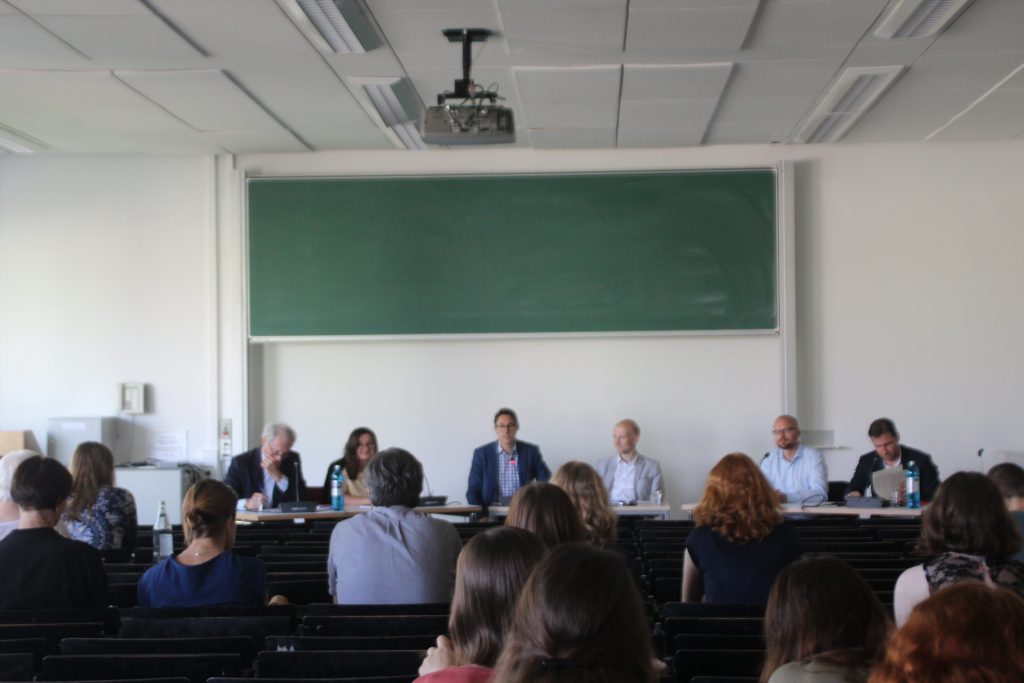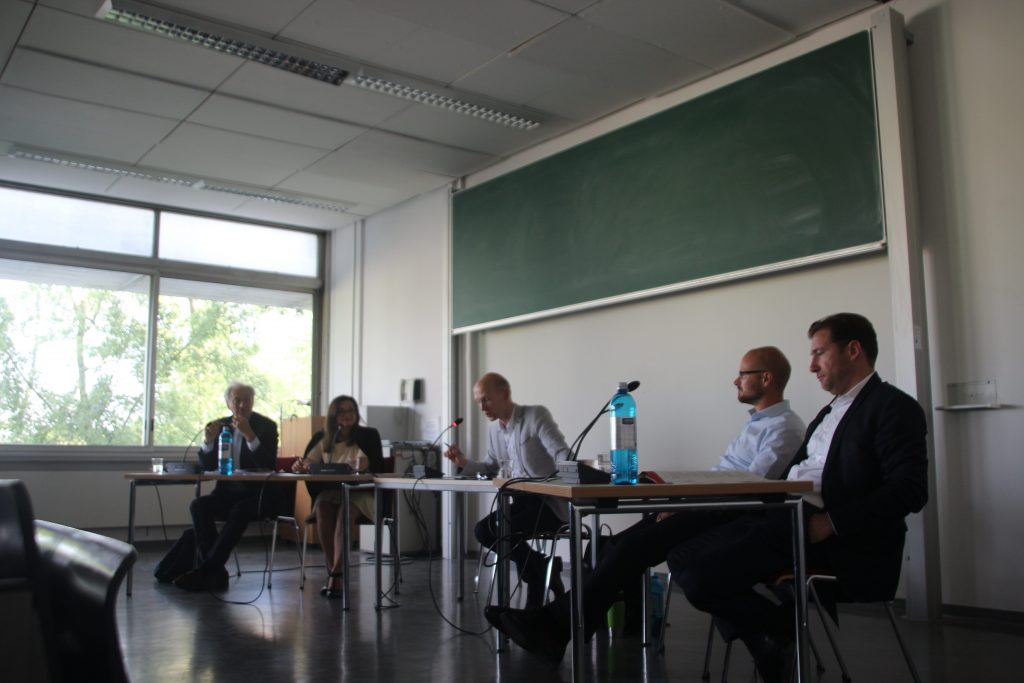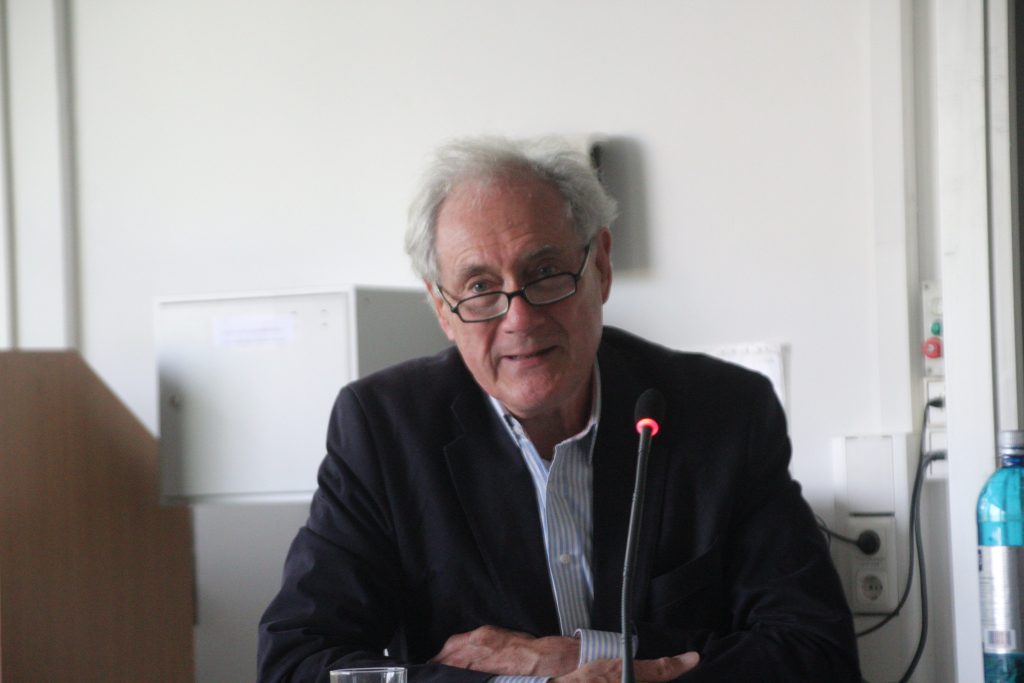Around two years after the Brexit-Vote, the initial shock regarding the outcome seems to have mostly been processed by both the European Union and the United Kingdom. But even very patient observers are still waiting for a clear picture, as to how exactly Britain’s future relationship with the European Union is supposed to look like. The recent resignations by Brexit-Minister David Davis and Minister of Foreign Affairs Boris Johnson, sadly blend in with numerous political incidents that have caused irritation and confusion on both sides since the Vote in 2016.
Almost on the second anniversary of the referendum, the Jean Monnet Chair of European Integration, in cooperation with the Centre for Political Education of Rhineland Palatinate, has taken up the opportunity to invite a group of experts to discuss the different “Layers of Brexit”.


In the course of an interesting discussion, the participants Prof. Dr. Natalia Chaban, Dr. Deniz Alkan, Dr. Mathias Dubbert und Dr. Geoffrey Edwards – under the leadership of Dr. Falk Ostermann (Justus Liebig University Gießen)– shared their broad expert knowledge on Brexit in the areas of economics, culture and society. The roundtable left behind quickly the big — and not yet fully answered— question of just why Brexit happened, to concentrate deeply on the inevitable consequences.
It was Dr. Geoffrey Edwards (Cambridge University), the only English participant, who sought to clarify the so- called ‘Commonwealth myth’. In terms of trade agreements, he underlined just how much the British government overestimates its own position, while underestimating and downright denying the strong position of the former Commonwealth countries. Dr. Deniz Alkan, Director of International and Foreign Affairs for the state Rhineland Palatinate, underscored this observation, presenting an uncomfortable example: As of right now, the German state North Rhine-Westphalia alone has a larger trade volume with India than the whole of Great Britain. This raises the question as to how Britain expects to increase its overall trade with any of the former Commonwealth countries, especially with no trade agreements beyond WTO rules in place.
called ‘Commonwealth myth’. In terms of trade agreements, he underlined just how much the British government overestimates its own position, while underestimating and downright denying the strong position of the former Commonwealth countries. Dr. Deniz Alkan, Director of International and Foreign Affairs for the state Rhineland Palatinate, underscored this observation, presenting an uncomfortable example: As of right now, the German state North Rhine-Westphalia alone has a larger trade volume with India than the whole of Great Britain. This raises the question as to how Britain expects to increase its overall trade with any of the former Commonwealth countries, especially with no trade agreements beyond WTO rules in place.
Dr. Mathias Dubbert, Director of European Policy and EU Foreign Trade Promotion for the Association of German Chambers of Industry and Commerce in Brussels, also stressed the tremendous economic consequences of the Brexit vote. The lack of a political direction has manifested into actual insecurity on the business side —negative side effects that have already caused companies to withdraw from investing on the island. Furthermore, many British companies are struggling to find workers, whose fates have not been sealed or saved since the vote two years ago. As of right now, the British government still does not offer any solution. Prof. Dr. Natalia Chaban (Canterbury University) agreed, adding that the EU-27 continue to be perceived as a big and relevant market by international actors. She also offered insight on the broader political implications of Brexit for both the EU and the UK. According to her, Brexit has raised the international profile of the European Union, nonetheless feeding into a larger uncertainty about the future of the western world order.
The roundtable discussion closed, leaving doubts about the future of the EU-UK relationship. The participants mostly agreed with each other regarding the big challenge Brexit poses on either party. However, it remains unclear if a satisfying agreement can be found in time for Britain’s exit in 2019.






